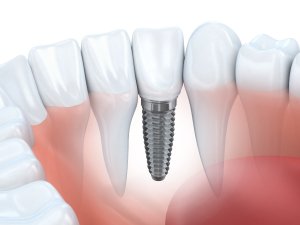Advertising Disclosure
Are dental implants your best option for a flawless smile?

For any number of reasons, you may be seeking to achieve a flawless smile. Some of your options are traditional orthodontics like braces, clear aligners such as Invisalign, dentures, bridges, and dental implants. When considering your options, you should take into account long-term upkeep, overall cost, and your medical history. Some dentists recommend dental implants as the best option for a perfect smile, but there’s a lot to consider before you commit to implants.
What are dental implants?
A dental implant is an artificial tooth root, essentially a screw, usually made from titanium. Your detnist places the implant in your jawbone, which allows it to bond with your natural bone. From here, an abutment goes on top of the implant to support the crown or artificial tooth. Dental implants can look and function similarly to a regular tooth, which is why dentists recommend them.
What type of dental implants are available?

What makes you a viable candidate for dental implants?
Your dentist or oral surgeon will make the ultimate decision after your consultation. However, typically the criteria they look for to determine your eligibility for dental implants are as follows: You have a missing tooth or teeth, good oral health, a fully grown jawbone, a healthy jawbone with enough bone to hold an implant, healthy gum tissue and good overall health. It’s also imperative that you are a nonsmoker and do not use any tobacco products. Be aware that the process of getting implants may take several weeks or months, depending on the work that needs to be done.
What are your options if you aren’t a viable candidate?
If your dentist does not feel that either type of implant would work for you, there are options still available. To prep you to become a viable candidate, you could undergo bone augmentation, ridge expansion or sinus augmentation. All of these options involve enhancing or strengthening the jawbone to handle the implants.
How much do dental implants cost?
The overall cost of getting dental implants depends on many factors, including your insurance and the type, number and location of the implants. This cost will vary from person to person, but when comparing the cost of implants to other options, it can be a more cost-efficient option in the long run. Just check with your insurance company to see if it’s a covered procedure and if your oral surgeon is within your network to keep costs low. If this is not an option, talk with your oral surgeon to see if they offer financing options or payment plans.
Are they any potential risks or complications from implant surgery?
As with any surgery, there is a possibility that you could experience complications from dental implant surgery. The potential risks include infection, a fractured implant, gum inflammation, severe pain or discomfort, or difficulty chewing. With that said, the risks and complications reduce when you go with an oral surgeon with experience in performing the surgery and ensuring that you are completely transparent with the doctor about your medical history. Statistically, the success rate of dental implant surgery is between 90% and 95%.
How do you maintain your implants to ensure they last?
To properly maintain your implants, your dentist and the dental surgeon will advise you to take care of your implants the same way you would care for your regular teeth. Ensuring that you are regularly visiting the dentist will ensure that the implants are in good condition and functioning. Your dentist may recommend that you use an interdental brush, in addition to your regular toothbrush. These brushes are designed to fit in the small spaces between your teeth and around the gums.








